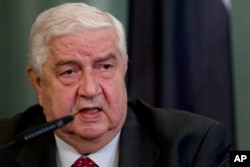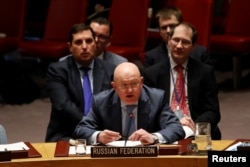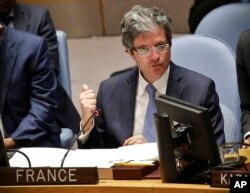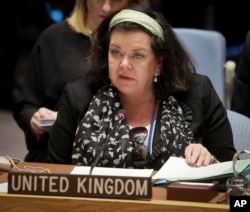The U.N. special envoy for Syria urged the international community on Friday to seize on the political momentum offered by several upcoming meetings to move toward ending that country's seven-year war and begin the transition to peace.
"There is, in my opinion, still a clear window of opportunity that needs to be urgently seized," Staffan de Mistura told members of the U.N. Security Council.
The envoy briefed the council via a video link from Beirut, following a meeting Wednesday in neighboring Damascus with Syrian Foreign Minister Walid Mouallem.
De Mistura's comments came ahead of his briefing to a summit Saturday in Istanbul of the leaders of Turkey, France, Germany and Russia, and as the government of Syrian President Bashar al-Assad signals a desire to see the United Nations less involved in his country's transition.
The envoy reiterated that Damascus objects to the U.N. having a role in identifying or selecting members of one of three lists of candidates for a proposed constitutional committee.
The committee is seen as a crucial step toward a credible and inclusive political process for ending the civil war. It is to be made up of representatives of three groups: the Assad government; a broad opposition delegation; and a third group comprising Syrian experts, civil society, independents, tribal leaders and women.
While the first two lists were accepted, Damascus has objected to the participants in the third group.
"The U.N. is not opposed to constructive and moderate suggestions, so long as we maintain the same spirit of credibility — I repeat: credibility — balance [and] international legitimacy" of the third list, de Mistura said.
The 71-year-old veteran diplomat, who will step down from his post at the end of November, is making a final push to generate a credible peace process. He noted the Istanbul summit, as well as an expected meeting between U.S. President Donald Trump and Russian President Vladimir Putin in Paris next month, along with a meeting Monday in London of Britain, France, the United States, Egypt, Germany, Jordan and Saudi Arabia on Syria, could be a catalyst for reinvigorating the political process.
Russia's U.N. Ambassador Vassily Nebenzia cautioned against forcing the constitutional committee process ahead too quickly.
"There are no grounds for establishing artificial deadlines for the establishment of the constitutional committee," Nebenzia argued. "Conditions cannot be imposed that contradict the will of the Syrian parties themselves."
But the French ambassador underscored that the idea for the constitutional committee originated from a Russian initiative and there is no reason to delay it further. He warned that the risk of military escalation still exists around the flashpoint province of Idlib if there is no progress on the political front.
"The creation of the constitutional committee can and must be the turning point we are looking for," Ambassador François Delattre told the council. "The first step is a genuine political movement."
"Either Russia has given the U.N. and this council assurances it has proved too weak to deliver on, or it was all a cynical smokescreen designed to divert attention and energy while Russia, Syria and Iran prosecuted the military campaign," said British envoy Karen Pierce.
No successor has been named yet for U.N. envoy de Mistura, who has been at his post since July 2014. He was the third envoy to take up the role after both the late Kofi Annan and Algerian diplomat Lakhdar Brahimi quit in frustration. While de Mistura has won small concessions and negotiated short-term cease-fires during his tenure, a permanent end to the conflict has eluded his efforts.








